Containerized Solar Generators Market Research, 2032
The global containerized solar generators market size was valued at $463.2 million in 2022, and containerized solar generators industry is projected to reach $941.3 million by 2032, growing at a CAGR of 7.4% from 2023 to 2032.
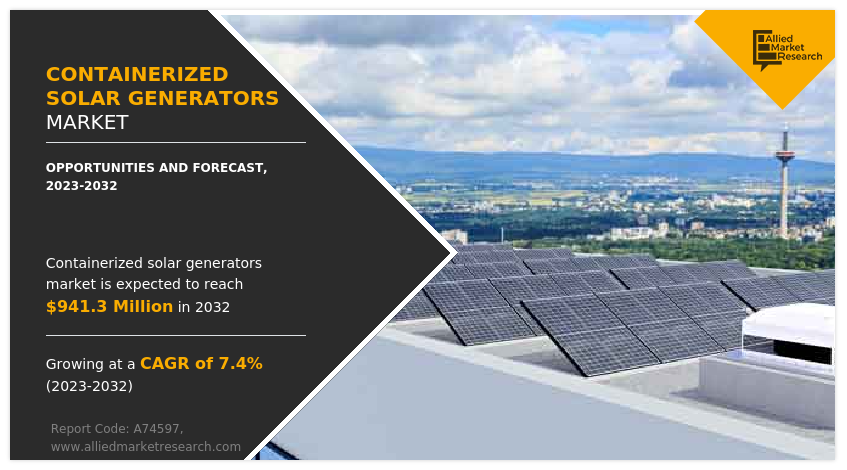
Containerized solar generators combine photovoltaic (PV) solar panels, energy storage systems, power electronics, and control mechanisms into a single self-contained unit. These portable solar power systems are designed to provide reliable and renewable energy in remote or off-grid locations where traditional power infrastructure is limited or non-existent. The containers housing the solar generators are typically equipped with inverters, battery banks, monitoring systems, and other necessary components to convert and store solar energy efficiently.
Containerized solar generators offer several advantages. They are modular and scalable, allowing for easy transportation, installation, and expansion as needed. They provide a sustainable and environment-friendly alternative to fossil fuel-based generators, reducing greenhouse gas emissions and dependence on non-renewable energy sources. They may be used for various applications, including emergency power backup, remote construction sites, disaster relief efforts, military operations, and temporary installations for events or festivals.
The market for containerized solar generators has been driven by the growth in demand for clean energy solutions, increase in awareness of environmental sustainability, and advancements in solar power technologies. The market includes manufacturers, suppliers, and service providers involved in the production, customization, and deployment of containerized solar generator systems.
In addition, the market encompasses project developers, energy consultants, and end-users such as governments, businesses, NGOs, and individuals seeking reliable and renewable power sources in remote or underserved areas.
"Containerized Solar Generators: Powering Sustainable Energy Solutions"
Containerized solar generators have emerged as a game-changing technology in the field of sustainable energy, offering a portable and efficient solution for generating electricity. These generators combine solar power technology with containerization, resulting in a versatile and scalable energy solution that may be easily deployed in various locations.
The presence of major advantages of containerized solar generators such as their mobility and ease of deployment. These systems are housed within shipping containers, allowing for easy transportation and installation. This portability makes them an ideal solution for remote areas, disaster-stricken regions, or temporary power needs, such as outdoor events or construction sites.
Moreover, containerized solar generators harness the abundant and renewable energy of the sun, enabling the production of clean electricity without greenhouse gas emissions or dependence on traditional fossil fuels. This makes them an environment-friendly alternative to diesel generators or grid-connected power sources, reducing carbon footprint and mitigating the impacts of climate change.
The containerized solar generators market growth is driven by multiple factors. The increase in demand for clean and sustainable energy solutions in both developed and developing countries has created a market for portable and off-grid power systems. In addition, the rise in awareness of environmental issues and the need to reduce reliance on non-renewable energy sources have prompted governments and organizations to invest in renewable energy technologies.
Furthermore, containerized solar generators offer a scalable and modular energy solution. These systems may be easily expanded by adding more containers or integrating with existing power infrastructure, allowing for increased energy production as demand grows. This scalability makes them suitable for a wide range of applications, from residential and commercial use to powering remote communities or disaster response operations.
However, challenges exist in the adoption of containerized solar generators. One significant obstacle is the initial cost of installation and equipment. The investment required to set up containerized solar generator systems may be a barrier, particularly for regions with limited financial resources. However, advancements in technology and economies of scale are expected to drive down costs over time, as with other renewable energy technologies, making these systems more affordable and accessible.
In addition, the need for technical expertise and maintenance of containerized solar generators poses a challenge, especially in areas with limited skilled personnel. Addressing this challenge requires investment in training programs, knowledge-sharing initiatives, and local capacity building to ensure the effective operation and maintenance of these systems.
The containerized solar generator market holds significant growth potential despite the challenges. Their portability, scalability, and renewable energy capabilities make them an attractive solution for a wide range of applications. Containerized solar generators pave the way for sustainable energy solutions and contribute to a greener and more resilient future by harnessing the power of the sun and providing clean electricity in a convenient and mobile package.
The development of containerized solar generators varies by region, influenced by factors such as energy demand, government policies, financial resources, and environmental concerns. Here is an overview of the development of containerized solar generators in different regions:
"Containerized solar generators development according to the region"
Containerized solar generators have gained traction in North America, driven by the surge in demand for clean and reliable energy solutions. In the U.S., government incentives, such as tax credits and grants, have spurred the adoption of renewable energy technologies, including containerized solar generators. These systems are often used for off-grid applications in remote areas or during emergencies, providing a sustainable and resilient power source.
Europe has been at the forefront of renewable energy adoption and containerized solar generators have found applications in various countries. Germany, for example, has a robust market for containerized solar generators due to favorable government policies and a strong focus on clean energy transition. These systems are utilized for temporary power needs, events, and off-grid applications, enabling the reduction of carbon emissions, and promoting energy independence.
Countries in the Asia Pacific region, particularly those with limited access to electricity or unreliable grid infrastructure, have adopted containerized solar generators. Rural areas in India, for instance, have deployed these systems to provide power to communities without access to the main grid.
In addition, countries such as Australia and Japan utilize containerized solar generators for off-grid applications, mining operations, and disaster relief efforts. Latin American countries show a growth in interest in containerized solar generators as they seek to diversify their energy mix and reduce dependence on fossil fuels. For example, in Chile, containerized solar generators are utilized in mining operations and remote areas to meet power demands sustainably. The favorable solar resources and increasing emphasis on renewable energy development contribute to the adoption of containerized solar generators in this region.
In Africa, containerized solar generators play a vital role in addressing energy access challenges. Many regions in Africa lack reliable grid infrastructure, making containerized solar generators a valuable solution to meet electricity needs. These systems are deployed in rural areas, schools, healthcare facilities, and refugee camps, providing clean and reliable power for essential services.
The containerized solar generators market forecast is segmented into type, storage capacity, application, and region. On the basis of type, the global containerized solar generators market is divided into off-grid and grid-connected. On the basis of storage capacity, the market is segregated into 10-40 kWh, 40-80 kWh, 80-150 kWh, and more than 150 kWh. On the basis of application, the market is bifurcated into residential, commercial, and industrial. On the basis of region, the market is studied across North America, Europe, Asia-Pacific, and LAMEA and suggests future growth opportunities.
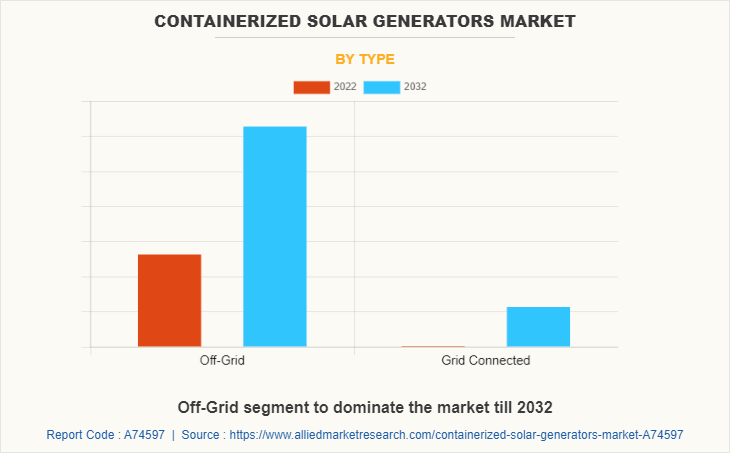
On the basis of type, the off-grid is expected to exhibit the largest market share due to the presence of a wide range of applications for energy storage from residential, commercial, and industrial applications in remote areas of developing countries.
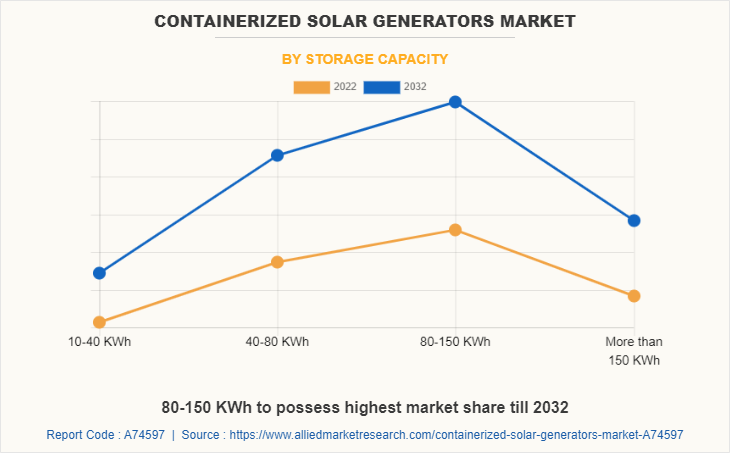
On the basis of storage capacity, the 80-150 kWh is expected to be the major shareholder due to a surge in infrastructure-related activities in developing countries such as India, China, and others have created a demand for this capacity containerized solar generators for power supply to the respective appliances on the field.
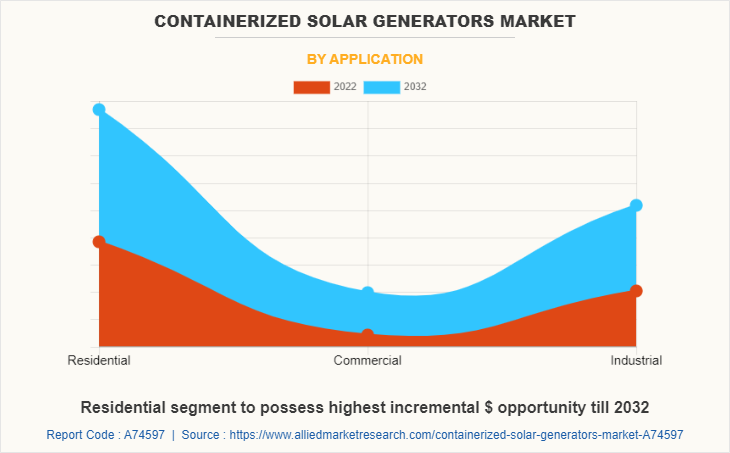
On the basis of application, the residential segment is expected to be the major shareholder due to the increase in awareness among home users regarding the advantages of the utilization of containerized solar generators for power supply.
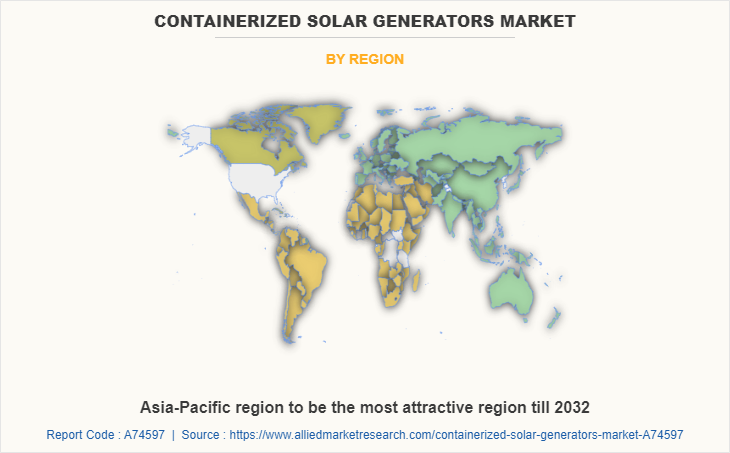
On the basis of region, Asia-Pacific is the major consumer of solar energy among other regions. It accounted for more than two-fifths of the global containerized solar generators market share in 2022. The containerized solar generator market in the Asia-Pacific experiences significant growth, driven by factors such as rapid urbanization, industrialization, and the increase in demand for sustainable energy solutions. Governments in the region promote renewable energy initiatives, creating opportunities for containerized solar generators to meet the electricity needs of remote and off-grid areas.
Impact of Covid-19 on Global Containerized Solar Generators Market
The COVID-19 pandemic had a mixed impact on the containerized solar generator market. Supply chain disruptions, project delays, and cancellations were experienced due to manufacturing, transportation, and construction activity restrictions.
However, the pandemic also highlighted the need for reliable and resilient energy systems, driving attention towards containerized solar generators as a source of power in emergency situations and off-grid locations. The policy measures and support of government for renewable energy helped mitigate the impact of the pandemic. The solar industry showcased adaptability through remote work policies and digital tools despite financing challenges. Overall, the pandemic has presented both challenges and opportunities, emphasizing the importance of energy resilience and remote power solutions.
Impact of Russia-Ukraine War on Global Containerized Solar Generators Market
The ongoing conflict between Russia and Ukraine has significant impacts on the containerized solar generator market. The war disrupted the supply chain, causing delays in component delivery and project timelines. Political and economic instability in the region lead to reduced investment and slower market growth. Shifting energy priorities during the conflict may temporarily decrease the demand for containerized solar generators as resources are allocated to critical infrastructure and emergency power needs. Government policies and incentives for renewable energy may be affected, potentially altering the level of support for solar projects. Security concerns hinder deployment in affected areas, but opportunities are anticipated to arise for temporary power solutions in areas affected by the conflict.
Competitive Landscape
Jakson Group, GSOL Energy, Intech GmbH & Co. KG, HCI Energy, Inc., Silicon CPV Ltd, BoxPower Inc., Lion Energy, Sun-In-One, Brisben Water, and Ecosun Innovations are some of the major players discussed in the report. Drivers, restraints, and opportunities are explained in the report to understand the market. Furthermore, the key strategies adopted by potential market leaders to facilitate effective planning have been discussed under the scope of the report.
Key Benefits For Stakeholders
- This report provides a quantitative analysis of the market segments, current trends, estimations, and dynamics of the containerized solar generators market analysis from 2022 to 2032 to identify the prevailing containerized solar generators market opportunities.
- The market research is offered along with information related to key drivers, restraints, and opportunities.
- Porter's five forces analysis highlights the potency of buyers and suppliers to enable stakeholders make profit-oriented business decisions and strengthen their supplier-buyer network.
- In-depth analysis of the containerized solar generators market segmentation assists to determine the prevailing market opportunities.
- Major countries in each region are mapped according to their revenue contribution to the global market.
- Market player positioning facilitates benchmarking and provides a clear understanding of the present position of the market players.
- The report includes the analysis of the regional as well as global containerized solar generators market trends, key players, market segments, application areas, and market growth strategies.
Containerized Solar Generators Market Report Highlights
| Aspects | Details |
| Market Size By 2032 | USD 941.3 million |
| Growth Rate | CAGR of 7.4% |
| Forecast period | 2022 - 2032 |
| Report Pages | 351 |
| By Type |
|
| By Storage Capacity |
|
| By Application |
|
| By Region |
|
| Key Market Players | Intech GmbH & Co. KG, GSOL Energy, BoxPower Inc., Sun-In-One, Ecosun Innovations, Brisben Water, Silicon CPV Ltd, HCI Energy, Inc., Lion Energy, Jakson Group |
Analyst Review
According to CXOs perspective, the containerized solar generators market is expected to witness high traction due to the growth in awareness among individuals and businesses regarding the benefits of renewable energy and the increase in need for clean and reliable power sources. Containerized solar generators are preferred over traditional generators as they offer a portable and scalable solution, allowing for easy deployment in various locations and applications.
The CXOs further added that the containerized solar generators market is poised for rapid growth during the forecast period due to several factors. The rise in demand for off-grid and remote power solutions, particularly in regions with limited access to the electrical grid or in emergency situations. Containerized solar generators provide a reliable and sustainable power source in such scenarios, reducing dependency on fossil fuels and minimizing environmental impact.
In addition, the market is driven by the growth in adoption of containerized solar generators in industries such as construction, mining, events, and disaster relief operations. These generators offer flexibility and mobility, allowing businesses to meet their temporary power requirements efficiently and cost-effectively. The scalability of containerized solar generators enables businesses to expand their power capacity as needed, making them an attractive solution for both short-term and long-term projects. Furthermore, government initiatives and incentives aimed at promoting renewable energy sources have played a crucial role in driving the containerized solar generators market. Many countries have implemented policies and regulations to encourage the adoption of clean energy solutions, which has created a favorable environment for market growth. These initiatives, coupled with the reduction in the cost of solar technology, make containerized solar generators more economically viable for businesses and organizations.
In terms of regional opportunities, the CXOs highlighted that the containerized solar generators market presents lucrative prospects across various regions, including North America, Europe, and Asia-Pacific. North America and Europe have witnessed significant growth due to the increase in emphasis on renewable energy targets and the need to reduce carbon emissions. Meanwhile, in the Asia-Pacific, the market is driven by the rise in demand for reliable and decentralized power solutions in developing countries, coupled with government support for renewable energy projects.
However, despite the numerous advantages and opportunities, the CXOs acknowledged that certain challenges remain for the containerized solar generators market. One of the key barriers is the initial installation cost, which is anticipated to be relatively high compared to traditional generators. Although the long-term cost savings and environmental benefits outweigh the initial investment, it remains a significant consideration for potential buyers. In addition, ensuring proper maintenance and operation of containerized solar generators is essential to maximize their performance and lifespan, requiring adequate training and technical support for end-users.
Renewable energy transition and remote and off-grid power needs are the key factors boosting the Containerized solar generator market growth.
Hybrid power systems is the Main Driver of Containerized solar generator Market.
Jakson Group, GSOL Energy, Intech GmbH & Co. KG, HCI Energy, Inc., Silicon CPV Ltd, BoxPower Inc., Lion Energy, Sun-In-One, Brisben Water, and Ecosun Innovations
Residential application is projected to increase the demand for Containerized solar generator Market
The containerized solar generators market is segmented into type, storage capacity, application, and region. On the basis of type, the global containerized solar generators market is divided into off-grid and grid-connected. On the basis of storage capacity, the market is segregated into 10-40 kWh, 40-80 kWh, 80-150 kWh, and more than 150 kWh. On the basis of application, the market is bifurcated into residential, commercial, and industrial. On the basis of region, the market is studied across North America, Europe, Asia-Pacific, and LAMEA.
The market value of Containerized solar generator in 2032 is expected to be $941.3 million
Loading Table Of Content...
Loading Research Methodology...



